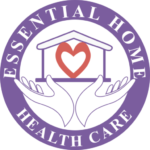If you want to work in the home health care field and want to work directly with patients in the medical sector but don’t have the time or money to train as a nurse, one alternative is to become a licensed home health aide. Many seniors choose to stay in their homes rather than in a nursing facility, and home health care aide services allow them. Anyone else with chronic illnesses or disabilities, to remain secure and healthy in a comfortable, familiar environment. If you’re wondering Is It Necessary For My Home Health Care Provider To Be Certified, call (847) 813-6301 to speak with one of our specialists or nurses.

Essential Home Health certified home health aides assist with basic tasks such as bathing, dressing, basic hygiene, and transfers. Light housekeeping and errands may also be assigned to you. In some places, you can also assist a healthcare practitioner in administering medication and taking vital signs. While certain responsibilities are similar to those performed by nurses, a home health aide has fewer medical responsibilities due to fewer training and education requirements. Your tasks focus on assisting your patient with mobility, hygiene, and comfort.
Federal Regulations
Any home health agency in the United States that takes Medicare must hire licensed home health aides. HHAs working at a CMS (Centers for Medicare and Medicaid Services) must have 75 hours of training, including 16 hours of on-the-job training, according to federal law. This is the minimum amount of required hours, and states can then decide whether or not to license HHAs working in their state, as well as whether or not extra training is required. It is, nevertheless, critical to distinguish between institutions that accept CMS and those that do not. There are no certification requirements for private companies that do not take Medicare.
State Regulations
As previously stated, HHA certification standards differ substantially in each state. There is no HHA-specific training program or designation in Wyoming. To become an HHA, you must first complete an accredited CNA program. Wyoming then establishes criteria for how home health agencies teach their home health aides. Home health agencies are required by state law to deliver 16 hours of additional training within the first two weeks of employment.
- In Wisconsin, prospective HHAs must first finish a CNA training program, followed by a test and a background check. A CNA in Wisconsin must have a total of 120 hours of training, including 32 clinical hours.
- To work as an HHA in Vermont, an applicant must first be a Licensed Nursing Assistant (LNA). The LNA training curriculum consists of 80 hours of classroom instruction and 30 hours of clinical instruction. All LNAs must pass a state exam and register with the state after completing the program.
- Illinois home health aides are enchanted by 120. They may have distinct names, and state code phrases may differ from everyday usage. 120 hours of instruction is likely. Illinois CNAs need 120 hours (CNAs). DSPs work the same hours (DSP). The Paraprofessional Healthcare Institute (PHI) mandates this for home health aides. Most states demand less.
What Will You Discover During Home Health Aide Training?
You will be trained in the following areas:
- Basic personal care requirements, such as bathing and showering.
- Other sorts of personal care include dental care.
- Medical indications and symptoms at their most basic.
- Taking basic vital signs, such as temperature and pulse.
- When someone appears flushed, it can be an indication of fever or another health problem.
Certified Home Health Aide Pay and Prospects
According to the Bureau of Labor Statistics, the typical annual salary for a home health assistant in 2021 was $14.07 per hour or $29,260.
However, salary varies widely based on region and state wage rules. Home health aide pay ranges from $9 to 18 per hour depending on location.

The good news is that home health aides can earn extra credentials that will boost their salaries. They can obtain additional certifications in geriatrics, cardiac patients, or behavioral issue patients to specialize and gain notoriety, and many employers will pay more for this. Additional certificates often allow aides to earn an additional 50 cents to $1 per hour.
Not only is there plenty of work in this field, but if you enjoy your job as a certified home health aide and want to advance your career, this is a fantastic place to start. You may, for example, further your education and become a physical therapist, respiratory therapist, or even a licensed nurse.
Visit our website or contact home health care near me at (847) 813-6301 to learn more about home health care. It’s okay to be the person asking “How Do I Prepare MY Home For Home Health Care Services?”, find out on our site now.
